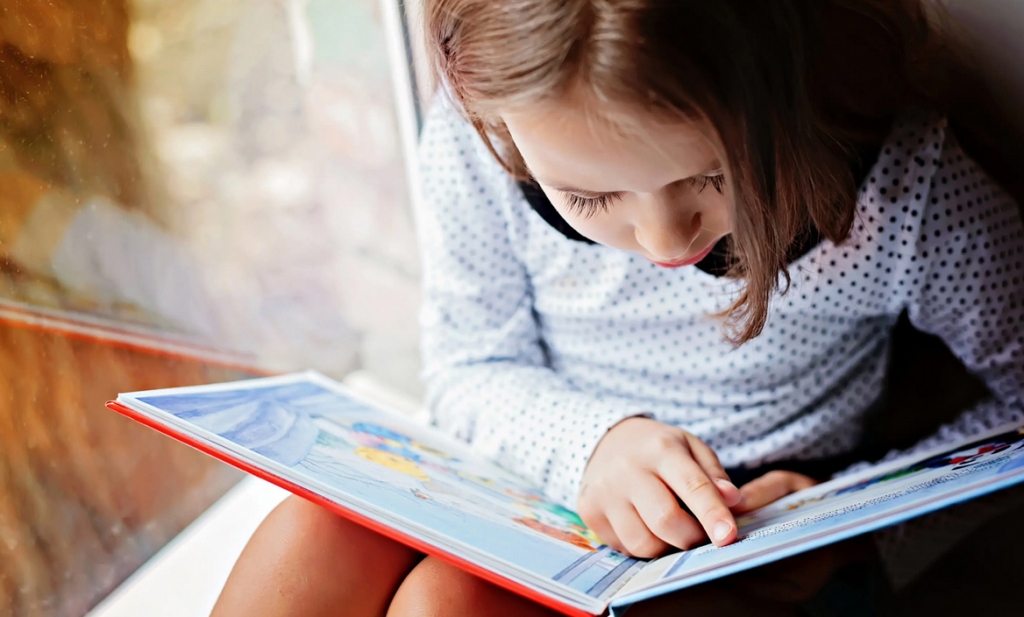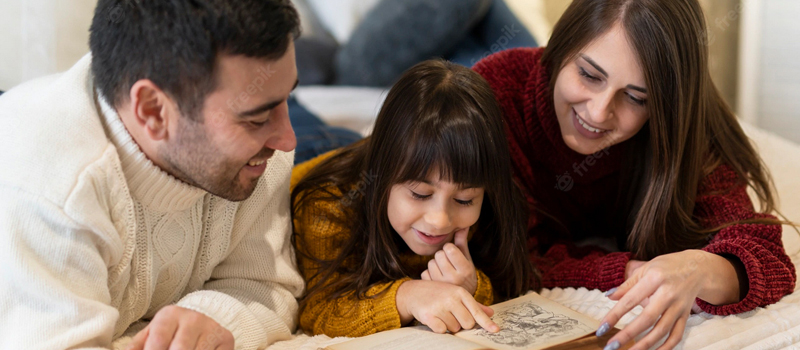It matters not who you are, when you become a parent you yearn to see your children succeed in life. What shape that success takes is totally arbitrary to the exception of one thing: Those who find success, or a semblance of their version of it, are those who can intake information visually and learn critical thinking and problem solving skills. They are able to find worth in the books around them, and utilize their worth to their own advantage.
It is our job as a parent to assist those that we bring into this world the opportunities for them to gain the confidence in themselves that they have those skills and can readily use them come what may. By equipping them with the self worth or esteem in their abilities starts out very simply in developing with them the love of reading. That they can look at something, understand it, and gain knowledge to use from it.
Reading strengthens minds and hearts, and widens ones horizons. It allows someone to learn something that they hadn’t known before. It informs them of what is happening around them and what others are trying to communicate to them. More importantly, it allows the one who likes to read a method to which they can improve their understanding, and grow their current standing in what they feel to be vital to their success. Instilling in our little ones the yearning to continue to add to their knowledge so that wisdom may spring from their exercise of it is key.
 While some kids have a predisposition for reading, others need constant encouragement to read. This encouragement is not a difficult thing to implement in your family. It takes only a half an hour a day, or more if you wish. First of all, show your kids reading is important to you. This is not something that you can simply tell them. They must see you reading for enjoyment and information purposes. Then when they ask you a question, show them also how they too could find the answer and show them the process of gathering the information wanted whether it be by a hardcopy book, or an online page. Let them get the experience by guiding them through finding it.
While some kids have a predisposition for reading, others need constant encouragement to read. This encouragement is not a difficult thing to implement in your family. It takes only a half an hour a day, or more if you wish. First of all, show your kids reading is important to you. This is not something that you can simply tell them. They must see you reading for enjoyment and information purposes. Then when they ask you a question, show them also how they too could find the answer and show them the process of gathering the information wanted whether it be by a hardcopy book, or an online page. Let them get the experience by guiding them through finding it.
Second, limit the screen time for watching videos. On TV or the computer, tablet or phone this type of activity is a passive one. It tends to turn off the brain, and the critical thinking skills they have. The world is trying to bottle-feed its warped information and entertainment to them, and it is extremely difficult, if not impossible, to sift out the good from the bad in that form. It is important to give your children the gift of discernment when it comes to what they turn to for entertainment.
Third, make learning readily available to them. When you keep books available, right at hand they can reach out on their own as they feel or desire to add to their knowledge. I can’t tell you, as a young boy, how valuable that set of Encyclopedia Britannica books were to my learning. Neither was that unabridged Webster’s Dictionary going to waste either. Buy books for their birthdays and Christmas gifts, or whatever holidays your family celebrates. Buy books as rewards for good behavior or good report cards, or any other time a gift is appropriate. Highlight the type of books that they get them excited about opening a book. Books are wonderful entertainment, less expensive than a movie or video game or the latest do-everything-for-you toy. If money is tight, make frequent trips to the library and utilize the inter-library loan system.
Fourth, from 1 to 9 years old read to your kids daily for at least 20 minutes. Find books that are fun and interesting to both you and your children. Not only does this encourage your children to read, it creates a stronger bond between the two of you. Some of my fondest childhood memories are of my mother and father reading to me.
Fifth, encourage your kids to read on their own. If they have spare time on their hands, have them reach out for a book rather than a video or video game. If your child is bored or ill, give them an adventure novel, instead of a gaming paddle.
Not a Full Consensus
Not everyone is going to agree with this, and may not follow this to a “T”. However, the more closely you can, it will set your child up for a better experience in life because they know within themselves how to maneuver in this world of ours, and how to advance their understandings, their outlook and standings they find themselves in. They can properly identify, seek the solution, solve the problem in front of them and overcome what previously was an obstacle for them.
Now that you have the steps of encouragement, finding the books is the next step. It is very important that the right books are chosen, but it isn’t difficult with the tens of thousands of great books out there on every subject!
First, talk to your children about their interests. Very small children usually love what their parents or those close to them are interested in. So if you love animals, picture books on animals will be a good start, especially as you are more likely to be more animated in your reading to them. (Quick note heredo the funny voices. Kids LOVE it, and there is no one there to hear but them. Don’t be embarrassed, just go with it.) Older kids will be able to articulate their own developing interests, and you can go from there.
Second, talk to your librarian or bookseller if you are unsure what to choose. They can guide you to the best books within your child’s interests, both new books and the classics. For older children, don’t forget the oldies but goodies books you may have enjoyed at that age, it’s a great place to start. These books are usually the best of the best.
Third, assess your child’s reading level. You don’t usually give a novel to an eight year old, but every child is unique, and what may be appropriate for one child may not be for another. Don’t be afraid to buy a twelve year old a picture book if they are not ready for a novel, but don’t hold back your eight year old if he is ready for a novel. Pushing a child too far and too fast or holding them back from what they are capable of are equally frustrating for a child. Let them set their own pace when it comes to reading, since you are striving to teach them the enjoyment of books.
Fourth, review your child’s books yourself before allowing the kids to read them. Some young adult and even middle grade books have themes that your child may not be emotionally ready for, and many books may run against your family’s religious beliefs. One way to avoid the current fad of wokeness is to be actively engaged with what your growing children are recommended to read from their peers, and yes unfortunately from their so called educators if you still have them in the public school system.
Fifth, discuss the books your children read. Find out what fascinates them about the book they just read. Get into details, and if you are unfamiliar with the book let them tell you all about it. This will help you to assess their changing reading level, to see if they are comprehending their reading, and to let them know you care about their reading interests.
Sixth, don’t be concerned if your child fixates on a single author. Kids do that and so do many adults. They may have found a style of writing that resonates with them or subject matter that is stirring. Everyone goes through and Edgar Allen Poe stage! Usually, once a kid has read everything by that author, they will move on to another. In my own life, I have fixated on different authors at different times, starting with Poe, moving on to C.S. Lewis, J.R.R. Tolkein, and so on down the line. As long as the writing is good, you have nothing to worry about.
Lastly, the books in your home reflect who you are as people. Try to have a wide variety of books that cover your interests, and the interests of your children. It is great to have those “How-To” books laying around amongst those of religious and autobiographical natures. But it doesn’t hurt to have a few fictional novels that can expand ones mind and allow them to dream the “What If’s”. Intermingle those books with the classics of Shelley, Byron, Franklin, Dickens onto Plato, Cicero and Marcus Agrelius and most everything in between. Our children’s books are a similar mix, chosen carefully to help them develop strong minds and still have fun.






